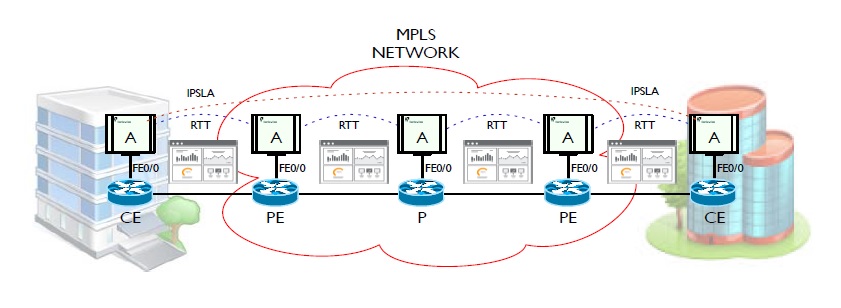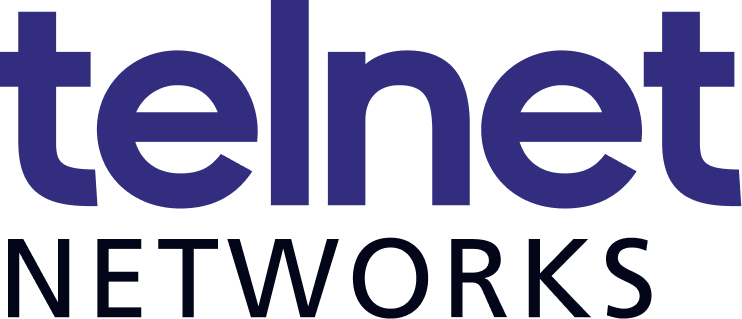Telecommunications operators, managed service providers (MSPs) and enterprise corporations, can simulate synthetic real-time communications, between the first to last hop, and every hop in between, of a network delivery path in order to determine the actual Next Hop Performance (NHP).
Using Raspberry Pi hardware with Infosim® StableNet® unified management system allows for a cost effective agent technology to measure network perfromance
Types of Use
So let us take a look at some of the options available to the telecoms and enterprise sectors whereby greater performance insight and visibility can be gained through the flexible deployment of this new agent.
Telecom and Managed Service Providers
MPLS networks are typically very complex and resource intensive, hence, there has always been reluctance in some cases to enable additional features, for example, IPSLA, as these configured functionalities take additional resource from the devices already transporting huge volumes of network traffic. With the cost effective agent option from Infosim®, this mitigates any resource concerns, as the agent is external to any devices within the MPLS cloud.
Figure 1 details a simplified view of how an inexpensive piece of hardware can now be deployed and interconnected into a single Ethernet port on every router, switch or Tap within the MPLS cloud.
Agent-to-Agent media scripts can be configured to perform detailed measurements. Media scripts are coded packages that are installed on the agent and placed in strategic areas of the network in order to conduct specific path tests, record, collect and report on real-time performance data. Types of media scripts include:
- Availability
- Bandwidth Usage
- Inter-Hop Propagation Delay
- Packet Loss
- Jitter
- MOSS
- R-Factor
- QoS Class Performance Reporting
- Route Changes
- IPSLA

StableNet® can then display and report on these statistics within a dashboard, web-service reports, or export the data into other analytic tools, e.g. Splunk™, integrate with other telco tools like Netcool™, or service tools, e.g. ServiceNOW™. The flexibility of how data is displayed or exported is one of the unique selling points of using StableNet® because it is a SOA (Service Orientated Architecture) based developed tool, which means it has an exceptionally flexible suite of API connect options.
A lot of Telecom operators and MSPs also provide a huge amount of ‘Wires-Only’ services to customers that, in most cases, provide no ’tail-end’ performance or availability management as the CPE is owned by the customer. With new carrier Ethernet services and NTE termination equipment it is now possible to deploy the cost effective agent together with the termination NTE device so as to provide additional performance monitoring, eliminate tail-end black hole visibility, and differentiate your ‘Wires-Only’ services that will delight your customers, improve retention and increase margins.
For Telcos and MSPs, the deployment of this technology not only provides greater insight of the performance within the MPLS clouds they operate, it also serves as a great ‘UP-Sell’ opportunity with additional ‘Value Add-Services’ to their customers and partners. Differentiating services by providing MPLS ‘In Cloud’ visibility will provide the transparency so many customers are now demanding.
Enterprise and Cloud Service Providers
For enterprise corporations and cloud service providers, the reality of being able to visualize the performance of the infrastructure an application service traverses End-to-End is now an affordable possibility. You want to know the inter-hop delay and round-trip-times between every hop in the communication delivery path, so as to quickly identify where bottlenecks or service affecting performance degradation is taking place. Being able to visualize the End-to-End performance in a single dashboard with detailed inter-hop performance metrics provides even greater understanding of the overall service experience.
Outsourced Enterprise
For enterprise corporations who have outsourced networks, data centers and cloud based services, this is a unique opportunity to deploy a cost effective End-to-End solution whereby greater visibility of the service performance and experience can be visualized. This unique insight is revolutionary for enterprise corporations with outsourced service operations as you can deploy the StableNet® solution as a service and accurately measure and cross-reference your contractual performance SLAs and, more importantly, experience ‘single pane of glass’ service visualization.


StableNet® is also extremely scalable, so small to extra-large deployments are easily accommodated, for example, we have deployments where 50,000+ agents are in operation, and supporting in excess of 100,000 devices.
VoIP and Video Services
VoIP and video real-time services require packet prioritization throughout the End-to-End delivery path of a given network. Assurance that your QoS configuration is being correctly marked, policed and trusted along the communications delivery path is essential.
VoIP in particular is sensitive to delay and needs to be prioritized and expedited from the VoIP hosting environment to the handset.
Call quality is an expected deliverable and being able to measure inter-hop QoS markings, delay, jitter, packet loss, MOSS, R Factor, IPSLA, and perform RTP call simulation means you have the control and knowledge of knowing exactly what the performance experience is of your VoIP services.
Conclusion
Using Raspberry PI agent with Infosim® provides detailed insight into the End-to-End performance of their networks and applications which gives you insight into the strengths and weaknesses of every communications hop within the service delivery path, so your mission critical networks and business applications can perform at the highest optimal level.





